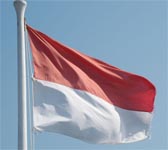Indonesia's Bali marks New Year's Day of Silence
 Bali Island, Indonesia - Residents and tourists on the popular Indonesian resort island of Bali on Thursday celebrated the annual Day of Silence, a Hindu New Year observance during which the island shuts down and people are banned from the streets.
Bali Island, Indonesia - Residents and tourists on the popular Indonesian resort island of Bali on Thursday celebrated the annual Day of Silence, a Hindu New Year observance during which the island shuts down and people are banned from the streets.
The New Year, called Nyepi, is one of the most important religious events for Balinese Hindus, and this year, they welcomed the Saka New Year of 1931.
At midnight Wednesday, the island's seaports, bus stations and airport closed down, not to reopen until 6 am Friday (2300 GMT Thursday), when the new Hindu year officially begins.
Bali's famous beaches were deserted, and residents and visitors alike were required to remain indoors and keep any conversations quiet. More than 3.5 million Balinese Hindus were fasting and meditating throughout the day and praying for a better future.
They are forbidden from lighting fires and turning on lights, televisions or radios during the 24-hour period.
Foreign visitors have been informed to stay in their hotels or guest lodgings, where they can still be served meals and relax - quietly - indoors or by the swimming pool. Hotels prepared various activities for guests not observing the Hindu Nyepi holiday by offering customized indoor activities.
The island was guarded by traditional Balinese security guards, or Pecalang, to ensure everyone abides by the holiday regulations.
Prior to New Year's Day, Balinese Hindus conducted a series of rituals that began Monday when thousands paraded to local beaches for the Melasti - the cleansing of utensils and, more importantly, their souls. It symbolizes the purification of the earth and the universe through the removal of evil elements.
On New Year's Eve, joyful residents took part in a noisy parade carrying huge paper-made effigies, known as Ogoh-Ogoh, which they burned before sunrise to symbolize all evil leaving the island ahead of the New Year.
Similar rituals were also held by Hindu followers on the nearby tourist island of Lombok and on Muslim-majority Java, including in the Indonesian capital, Jakarta.
Indonesia has the world's largest Muslim population at more than 190 million but also has minority Hindus, Christians, Buddhists and animists. (dpa)